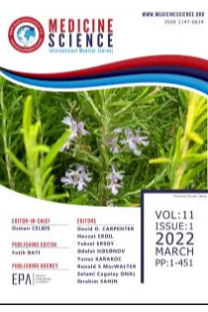Serum adropin levels in patients with acute ischemic stroke
___
1. Khoshnam SE, Winlow W, Farzaneh M, et al. Pathogenic mechanisms following ischemic stroke. Neurol Sci. 2017;38:1167-862. Hui C, Tadi P, Patti L. Ischemic Stroke. Updated 2019 Mar 19. In: StatPearls Internet. Treasure Island (FL): StatPearls Publishing; 2019 Jan.
3. XH Yu, K Qian, N Jiang, et al. ABCG5/ABCG8 in cholesterol excretion and atherosclerosis. Clin Chim Acta 2014;428:82-8.
4. Titov BV, Matveeva NA, Martynov MY, et al. Ischemic stroke as a complex polygenic disease. Mol Biol (Mosk). 2015;49:224-48.
5. Manzano JJ, De Silva DA, Pascual JL, et al. Associations of ankle-brachial index (ABI) with cerebral arterial disease and vascular events following ischemic stroke. Atherosclerosis. 2012;223:219–22.
6. Kumar KG, Trevaskis JL, Lam DD, et al. Identification of adropin as a secreted factor linking dietary macronutrient intake with energy homeostasis and lipid metabolism. Cell Metab. 2008;8:468–81.
7. Lovren F, Pan Y, Quan A, et al. Adropin is a novel regulator of endothelial function. Circulation. 2010;122:185–92.
8. Kathir K, Adams MR. Endothelial dysfunction as a predictor of acute coronary syndromes. Semin Vasc Med. 2003;3:355–62.
9. Wu L, Fang J, Chen L, et al. Low serum adropin is associated with coronary atherosclerosis in type 2 diabetic and non-diabetic patients. Clin Chem Lab Med. 2014;52:751–8.
10. Yu HY, Zhao P, Wu MC, et al. Serum adropin levels are decreased in patients with acute myocardial infarction. Regul Pept. 2014;190-191:46-9.
11. Ertem AG, Ünal S, Efe TH, et al. Association between serum adropin level and burden of coronary artery disease in patients with non-ST elevation myocardial infarction. Anatol J Cardiol. 2017;17:119-124.
12. Shahjouei S, Ansari S, Pourmotabbed T, et al. Potential roles of adropin in central nervous system: review of current literature. Front Mol Biosci. 2016;3:25.
13. Alp NJ, Channon KM. Regulation of endothelial nitric oxide synthase by tetrahydrobiopterin in vascular disease. Arterioscler Thromb Vasc Biol. 2004;24:413–20.
14. Zhao LP, You T, Chan SP, et al. Adropin is associated with hyperhomocysteine and coronary atherosclerosis. Exp Ther Med. 2016;11:1065-70
15. Yang C, DeMars KM, Hawkins KE, et al. Adropin reduces paracellular permeability of rat brain endothelial cells exposed to ischemia-like conditions. Peptides. 2016;81:29-37.
16. Szewczak K, Niespialowska M, Solarska BJ, et al. Prospective of ischemic stroke biomarkers. Curr Issues Pharm Med Sci. 2017;30:69-74.
17. Monbailliu T, Goossens J, Hachimi-Idrissi S. Blood protein biomarkers as diagnostic tool for ischemic stroke: a systematic review. Biomark Med. 2017;11:503-12.
18. Aydin S. Three new players in energy regulation: preptin, adropin and irisin. Peptides. 2014;56:94–110.
19. Butler AA, Tam CS, Stanhope KL, et al. Low circulating adropin concentrations with obesity and aging correlate with risk factors for metabolic disease and increase after gastric bypass surgery in humans. J Clin Endocrinol Metab. 2012;97:3783–91.
20. Lian W, Gu X, Qin Y, et al. Elevated plasma levels of adropin in heart failure patients. Intern Med. 2011;50:1523–7.
- ISSN: 2147-0634
- Yayın Aralığı: 4
- Başlangıç: 2012
- Yayıncı: Effect Publishing Agency ( EPA )
Some features of hospitalized elderly and effects of fall behavior on fall risk
Ummuhan AKTURK, Emine Derya ISTER
Neslihan ALTUNKAYA, Duygu Demiroz ASLAN
Hasan Hüseyin ARSLAN, Eyup SARİ
Serum adropin levels in patients with acute ischemic stroke
Mucahit GUNAYDİN, Ali AYGUN, Murat USTA, Abdussamed VURAL, Faruk OZSAHİN
Posterior fossa emissary venous canal prevelance and visibility on standart computed tomography
Pinar Gulmez CAKMAK, Duygu EREK, Furkan UFUK, Ergin SAGTAS, Muhammet ARSLAN
Our laparoscopic gynecological surgery experience through a single incision
